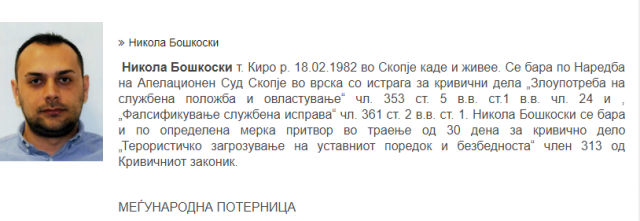Four international arrest warrants issued by Macedonian police – three European states refusing to extradite the refugees, one explanation – the refugees are victims of political persecution in Macedonia.
Thus, in the 21st century, Macedonia becomes the only state in Europe that has four political asylum seekers: Nikola Boskoski, Goran Grujevski, Nikola Gruevski and Dejan Davidovski.

Although the information arrived amidst the “Racket” affair, it did not go unnoticed that one of the world’s most independent and efficient judiciaries – the Swedish rejected the request by Macedonian state authorities to extradite Dejan Davidovski, accused of involvement in the Parliament events of April 27, 2017. Dejan Davidovski was arrested in Sweden in April this year on Interpol warrant. According to the Swedish court, Dejan Davidovski is persecuted and should be tried in a political, not a criminal process, and there is insufficient evidence of terrorism. The final assessment is that there is no fair and legally established procedure for this case. Therefore, the Swedish court recommends Dejan Davidovski to apply for asylum in order not to be a target for political persecution from Macedonia.

Former Prime Minister Nikola Gruevski was granted political asylum in Hungary on November 20 last year.
https://archive.english.republika.mk/hungarian-authorities-approved-gruevskis-political-asylum-request-writes-magyar-idok/
The Office of Immigration conducted a detailed investigation into Gruevski’s request, including his allegations that he received death threats in Macedonia. The asylum application stated that Gruevski was a target of political persecution by the Macedonian government.
The Office concluded that, if he returned to Macedonia, Gruevski would be subject to government persecution for his political activities, the Hungarian authorities said.
The paper, which published the details of the Hungarian authorities’ decision, also cites serious remarks about the judiciary in the Republic of Macedonia, noted in the European Commission’s 2018 report, as well as in other relevant reports. It was considered how court cases were assigned to certain judges deemed to be politically influenced. The appointment of the new President of the Criminal Court in Skopje, the acceleration of the five trials against Gruevski, Greece’s refusal to extradite Goran Grujevski and Nikola Boskovski, who are also indicted by the SPO, the conduct of Judge Dobrila Kacarska in the case of the procurement of the armored Mercedes and the speed with which decisions were taken against Gruevski are just some of the examples that have been considered.


After eight months in jail for illegally entering the country, Nikola Boskoski and Goran Grujevski are also free citizens in Greece. The Greek Supreme Court has rejected the request by the Macedonian Ministry of Justice for the extradition of Grujevski and Boskoski on the grounds that there are no conditions for a fair trial in the country.
What the Macedonian legal experts have claimed is confirmed by the Supreme Court of Greece – Gruevski and Boskoski have been pardoned by President Gjorge Ivanov, and once pardoned it cannot be revoked. Referring to European Court of Human Rights rulings, the main argument for the Greek Supreme Court to accept their complaint and not to extradite them home to face court processes for mass wiretapping was precisely Ivanov’s pardon, which he pulled out under political pressure.
The lawyer of the former intelligence officers, Petar Vasilev, said in May last year after the Greek court ruling that the Greek court released from political pressure and influence had ruled in accordance with international and European law.




Comments are closed for this post.